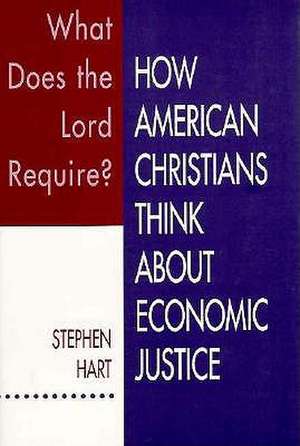What Does the Lord Require?: How American Christians Think about Economic Justice
Autor Stephen Harten Limba Engleză Paperback – apr 1996
In this engaging and lively book, Stephen Hart paints a rich portrait of how everyday Christians connect their faith to political issues like economic equality, government intervention, and the rights of private enterprise. Drawing on interviews with forty-seven "ordinary" Christians--Roman Catholics, Evangelical and Pentecostal Protestants, mainline Protestants, and others--Hart argues that Christians do not always learn a conservative political perspective from their religion, as is often the stereotype. Rather, Christian traditions provide a reservoir of resources that supports such varied values as equality, community, individuality, and freedom. Hart profiles these individuals and allows them to explain in their own words how they use these values to formulate views on social justice issues, supporting political positions ranging from left to right. Hart also provides a new way of understanding how religion affects public discourse. This first paperback edition includes a new analysis of recent trends in religious politics, including the religious right and religiously-based movements for peace and justice.
Preț: 141.46 lei
Nou
Puncte Express: 212
Preț estimativ în valută:
27.09€ • 28.20$ • 22.47£
27.09€ • 28.20$ • 22.47£
Carte indisponibilă temporar
Doresc să fiu notificat când acest titlu va fi disponibil:
Se trimite...
Preluare comenzi: 021 569.72.76
Specificații
ISBN-13: 9780813523255
ISBN-10: 0813523257
Pagini: 288
Dimensiuni: 152 x 229 x 15 mm
Greutate: 0.48 kg
Ediția:None
Editura: Rutgers University Press
Colecția Rutgers University Press
ISBN-10: 0813523257
Pagini: 288
Dimensiuni: 152 x 229 x 15 mm
Greutate: 0.48 kg
Ediția:None
Editura: Rutgers University Press
Colecția Rutgers University Press
Descriere
In this engaging and lively book, Stephen Hart paints a rich portrait of how everyday Christians connect their faith to political issues like economic equality, government intervention, and the rights of private enterprise. Drawing on interviews with forty-seven "ordinary" Christians--Roman Catholics, Evangelical and Pentecostal Protestants, mainline Protestants, and others--Hart argues that Christians do not always learn a conservative political perspective from their religion, as is often the stereotype. Rather, Christian traditions provide a reservoir of resources that supports such varied values as equality, community, individuality, and freedom. Hart profiles these individuals and allows them to explain in their own words how they use these values to formulate views on social justice issues, supporting political positions ranging from left to right. Hart also provides a new way of understanding how religion affects public discourse. This first paperback edition includes a new analysis of recent trends in religious politics, including the religious right and religiously-based movements for peace and justice.
